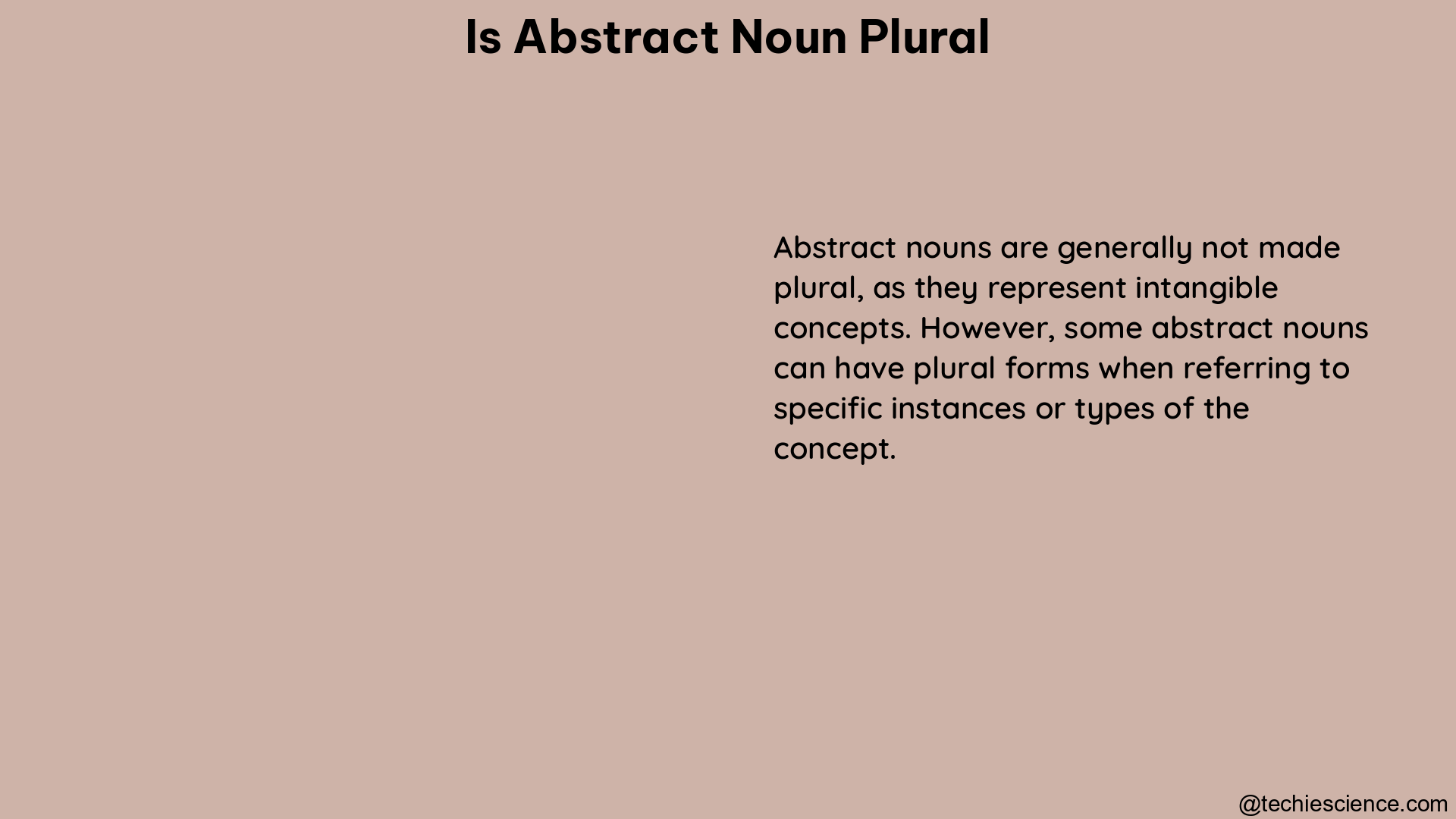Abstract nouns are a fascinating and complex aspect of the English language, and the question of whether they can be pluralized is a nuanced one. In this comprehensive guide, we will delve into the intricacies of abstract nouns, their countability, plural forms, contextual usage, and the concept of notional agreement. By the end of this article, you’ll have a deep understanding of the rules and exceptions surrounding the pluralization of abstract nouns.
Understanding Abstract Nouns
Definition and Characteristics
Abstract nouns are defined as nouns that represent intangible ideas, qualities, or states rather than concrete objects. They are the opposite of concrete nouns, which refer to tangible, physical entities. Examples of abstract nouns include love, happiness, freedom, justice, and courage.
One of the key characteristics of abstract nouns is that they cannot be perceived through the five senses. They exist in the realm of thoughts, emotions, and concepts, rather than in the physical world. This makes them inherently different from concrete nouns, which can be seen, heard, touched, tasted, or smelled.
Countability of Abstract Nouns
Abstract nouns can be either countable or uncountable, and this distinction plays a crucial role in their pluralization.
Countable Abstract Nouns
Countable abstract nouns are those that can be enumerated or quantified. They can be preceded by a number or a determiner like “a” or “the,” and they can be pluralized. Examples of countable abstract nouns include:
- Successes
- Failures
- Achievements
- Decisions
- Opinions
In these cases, the plural form is created by adding the standard plural suffix “-s” or “-es” to the singular form.
Uncountable Abstract Nouns
Uncountable abstract nouns, on the other hand, cannot be enumerated or quantified. They are treated as a single, indivisible concept and cannot be pluralized. Examples of uncountable abstract nouns include:
- Love
- Happiness
- Anger
- Patience
- Knowledge
Attempting to pluralize these abstract nouns would result in ungrammatical constructions like “happinesses” or “knowledges,” which are not valid in standard English.
Plural Forms of Abstract Nouns

Identical Plural Form
In many cases, the plural form of an abstract noun is identical to the singular form. This is because the abstract nature of the noun does not change, regardless of whether it is singular or plural. Examples include:
- Courage (singular) / Courage (plural)
- Wisdom (singular) / Wisdom (plural)
- Honesty (singular) / Honesty (plural)
In these instances, the context and the use of determiners or quantifiers will indicate whether the abstract noun is being used in the singular or plural sense.
Pluralized Abstract Nouns
While the plural form of abstract nouns is often the same as the singular, there are instances where abstract nouns can be pluralized. This typically occurs when the abstract noun is being used to refer to specific instances or manifestations of the concept, rather than the concept as a whole.
Examples of pluralized abstract nouns include:
- Successes (multiple achievements)
- Failures (various unsuccessful attempts)
- Emotions (different feelings)
- Beliefs (various convictions or opinions)
- Freedoms (specific liberties or rights)
In these cases, the plural form is created by adding the standard plural suffix “-s” or “-es” to the singular form of the abstract noun.
Contextual Usage and Notional Agreement
The pluralization of abstract nouns can also be influenced by the context in which they are used and the concept of notional agreement.
Contextual Usage
The way an abstract noun is used in a sentence can determine whether it is treated as singular or plural. For example, consider the following sentences:
- “His enthusiasm and dedication were admirable.” (Plural)
- “His enthusiasm and dedication was admirable.” (Singular)
In the first sentence, “enthusiasm” and “dedication” are treated as separate qualities, hence the plural verb form “were.” In the second sentence, they are viewed as a single, combined concept, leading to the singular verb form “was.”
Notional Agreement
Notional agreement refers to the idea that the verb form used with an abstract noun can be based on the intended meaning or concept, rather than the strict grammatical form. This can lead to variations in pluralization, depending on how the abstract noun is perceived in the context.
For instance, consider the following examples:
- “The team’s enthusiasm was evident.” (Singular)
- “The team’s enthusiasms were evident.” (Plural)
In the first example, the abstract noun “enthusiasm” is treated as a collective, singular concept. In the second example, the plural form “enthusiasms” is used to emphasize the individual, distinct expressions of enthusiasm within the team.
Notional agreement allows for more flexibility in the use of abstract nouns, as the speaker or writer can choose the verb form that best conveys the intended meaning, even if it doesn’t strictly align with the grammatical number.
Exceptions and Special Cases
While the general guidelines for the pluralization of abstract nouns have been covered, there are some exceptions and special cases to be aware of:
-
Derived Abstract Nouns: Some abstract nouns are derived from other parts of speech, such as verbs or adjectives. These derived abstract nouns may have unique plural forms that don’t follow the standard rules. For example, “belief” (noun) has the plural form “beliefs,” while “beautiful” (adjective) has the derived abstract noun “beauty” (singular).
-
Collective Abstract Nouns: Certain abstract nouns can be used to refer to a collective or group of related concepts. In these cases, the noun may be treated as singular or plural, depending on the context. Examples include “knowledge,” “information,” and “data.”
-
Idiomatic Expressions: Abstract nouns may be used in fixed idiomatic expressions, where the plural form may not follow the standard rules. For instance, the expression “ups and downs” uses the plural form of the abstract noun “up” and “down,” even though the singular forms would be “up” and “down.”
-
Borrowed Abstract Nouns: Abstract nouns that have been borrowed from other languages may retain their original plural forms, which may not align with English pluralization conventions. Examples include “phenomena” (from Greek) and “analyses” (from Greek).
By understanding these exceptions and special cases, you can navigate the complexities of abstract noun pluralization with greater confidence and precision.
Conclusion
The pluralization of abstract nouns is a nuanced and complex topic in the English language. While some abstract nouns can be pluralized, others cannot, and the choice often depends on the countability, context, and notional agreement surrounding the use of the noun.
By mastering the concepts covered in this comprehensive guide, you’ll be equipped to confidently navigate the pluralization of abstract nouns in your written and spoken communication. Remember, the key is to pay attention to the specific characteristics and usage of each abstract noun, and to be mindful of the contextual factors that can influence its plural form.
Happy learning!
Reference:
– Countable and Uncountable Nouns
– Plural Nouns
– Notional Agreement

Hi…. I am Goutam Datta. I have completed a double M. A. in English and B. Ed. I am a creative writer. Currently, I am a part of the LambdaGeeks.